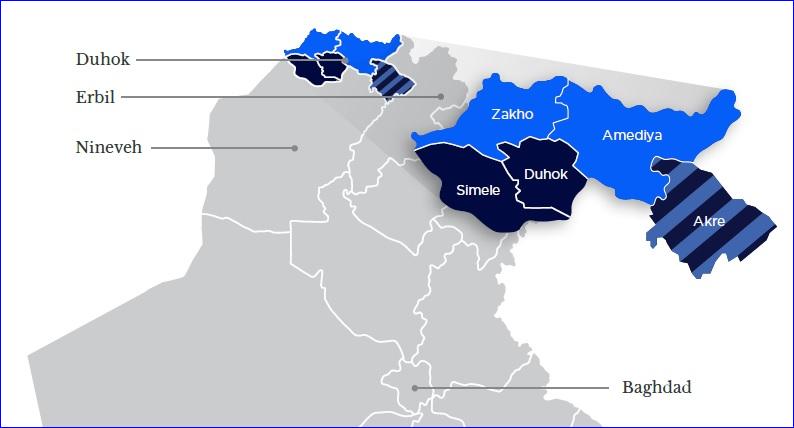


The PKK's presence in these areas effectively transfers its decades-long conflict with Turkey to northern Iraq. The PKK continues to endanger civilian populations by operating from or near civilian areas, carrying out attacks on Turkey and Turkish military bases in the KRI.
Read the full report: Caught In The Crossfire: Assyrians and The Turkey-PKK Conflict In Iraq
Turkey has consistently pursued the PKK in northern Iraq with little regard for the negative consequences for civilian populations who inhabit the same areas occupied by the militant group. The airborne attacks often occur in close proximity to areas mainly inhabited by Assyrian, Yazidi, and/or Kurdish civilians, posing significant risks including: endangerment of civilian life, displacement, traumatization, destruction of property and agricultural lands, and threats to livelihoods.
Ultimately, those set to suffer most in the ongoing hostilities are vulnerable peoples like Assyrians and Yazidis--many of whom have been displaced multiple times, with smaller numbers who now live in temporary accommodation as a result of recent strikes. The rapid deterioration of security in Iraq after 2003 brought forward the largest exodus of its Assyrian population, including in the KRI, and Turkey's pursuit of the PKK in Iraq has only exacerbated the situation. Three principal areas inhabited by Assyrians in Duhok Governorate are affected by the Turkey-PKK conflict in Iraq: the Barwar region and Sapna Valley in Amediya District; Zakho District; and Nahla Valley in Akre District.
Though Assyrians do not take part in the hostilities, they experience the direct consequences of this conflict. For decades, Assyrians have been caught in the crossfire of the wider Turkey-PKK conflict, including in neighboring Turkey where Assyrian villages in Mardin Province and Şırnak Province were emptied of their indigenous inhabitants as a result of the heightened conflict in the 1980s.8 More recently in Syria, Turkey has targeted the People's Protection Units (YPG), a PKK-affiliated militia, in parts of the Khabour Region--further diminishing any prospects for return for Assyrians displaced by ISIS.9 Fareed Yacoob, an Assyrian parliamentarian serving in the Iraqi Kurdistan Parliament, told the Assyrian Policy Institute: "Assyrians always end up paying the biggest price for conflicts they want no part in."10
Indeed, Iraq's Assyrians have been witnesses to and victims of war, ethno-religious persecution, forced displacement, ethnic cleansing, and genocide. While many have, to some extent, become accustomed to violence, the destructive and highly visible nature of the strikes often cause a re-traumatization of these experiences, leading to increased feelings of insecurity and uncertainty.
Despite mounting pressure against Turkey's operations in the region, the airstrikes continue. Prospects for nonviolent ways forward look bleak. Turkey has consolidated its presence on the ground in the KRI, establishing additional military bases in Duhok and Erbil Governorates.11 The PKK shows no signs of withdrawal from their current positions near Assyrian villages in the KRI. Tensions between the ruling Kurdistan Democratic Party (KDP) and the PKK have risen in recent months over control of strategic territories.12 Inaction from the Iraqi Government and the Kurdistan Regional Government (KRG) has left locals unconvinced of the government's ability to maintain control and resolve the conflict.
The ongoing Turkey-PKK conflict must be seen both within the microcosm of regional geopolitics and within the context of heightening risks for threatened groups like Assyrians. This report focuses exclusively on the situation for the Assyrian people in the context of the Turkey-PKK conflict in northern Iraq. It documents the consistent challenges to their security and livelihoods as a result of this conflict, and conveys recommendations drafted out of concern for Assyrian human rights and longevity in Iraq.

or register to post a comment.